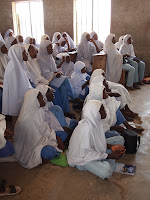If you know me, you'll know that patience is definitely not one of my virtues...I have a strong bias for action, and definitely find a strange satisfaction in "checking boxes" on my to-do list. I am happy to share what I know with others, but usually after explaining something about 3 times, my patience would have run out...
Working in Africa has been great in the sense that because the markets are so under-developed, if you just get a few things right, you could make a huge impact. Contrary to the ultra-developed markets in the West, where lots and lots of effort is required to move the dial just a little bit. Everyday, I am excited by the large number of opportunities I see here, but at the same time, I struggle to accept the slow pace at which we're taking to capture those opportunities.
One of my quandaries is the fact that it's not possible (or sustainable) for me to be doing everything since there is limited amount of hours I can work yet there are so many things I can see myself just go and do! Because the capacity of the human capital here is quite a bit lower than what I'm used to in the US, I spend a good portion of my day training and explaining to people what they are supposed to do and how they are supposed to do them. Consequently, I found myself frequently in a frustrating situation where I am spending hours and hours repeatedly explaining to the same person something I could easily complete in 30 minutes and STILL am not sure if the message has gotten through. At that point, the temptation to just do it myself becomes quite difficult to resist. (sometimes, I wonder if this is what parenting difficult children feels like...)
 |
this is what I felt like after explaining how to do
management accounting to my accountant for the 10th time |
With the disclaimer that this is a broad generalization, what I found is that African are very entrepreneurial, creative, and flexible, but they lack planning skills, detail orientation, and strategic focus in general. This is almost the exact opposite of my background in Corporate America where excessive planning nearly stifles creativity.
What I am facing in Africa probably isn't too different from what one may find in a start up; however, unlike a start up where you can hire someone with a more "CEO-like" skill once the organization grow large enough so he can help institute better process to fuel further growth, Africa as a continent have to gain such skill set over time on its own since it cannot just "import" a CEO to run the country...that was called colonialism, and we all know how that turned out...
I had a long discussion with my manager on the difference between competency and skills...he argues that competency cannot be trained while skill can, and in his mind, planning and detail orientation is a competency, not a skill...in his word, "there is no point trying to train a porcupine into a lamb"...this is a bit discouraging to me as I really believe that planning and strategic focus are such important skills to leverage limited resources for maximum growth, and I am a little bit more optimistic in the sense that people can stretch their competencies over time.
To me, doing capacity building type work is quite rewarding. I feel as though I'm stretching the value of my expensive education by extending the beneficiary beyond just myself to everyone I have worked with along the way. I just need to constantly remind myself to treat my work as capacity building, so that if the deadline is not met or the end result is sub-optimal, I could accept that is just part of the learning process and is a necessary evil and that in the long run, it will pay off because I would have more appropriately transferred the knowledge vs. just doing everything by myself, to perfection and on time, but no one will be here to replicate the work when I am gone...



































